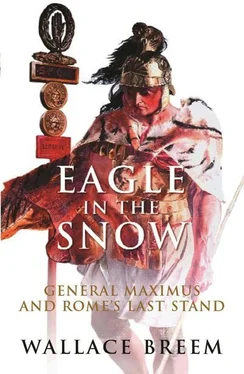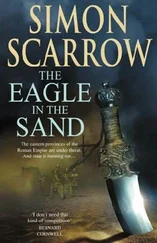A cohort commander came running towards me, his long sword flapping at his side. “Everything is ready, sir. General Veronius has gone on ahead. We await your orders.”
“Tell the head of the column to march. When they contact our advance-guard they will take their orders from the general. I will join you with the rear-guard as soon as I can. I am only waiting for the tribune, Fabianus.”
He saluted and went back to his men. In a little while I heard the rumble of waggon wheels and the steady tramping of the cohorts as they marched out of earshot.
I waited. The water dripped through the hour-glass in my orderly’s hand until it was all gone. Then he turned it over and it started again…. I must have dozed for a while for I found myself yawning and shivering with cold. I turned to speak to him, and then I saw fire, great tongues of flame leaping up from the camp, both from the sides and the centre. Fireballs hurtled outwards into the surrounding town and the huddled rows of wooden shacks caught fire, one by one, as columns of black smoke, thick and oily, spread outwards and hid the flames from our sight. The shrieks and yells of the barbarians came to us, even at that distance, and then out of the smoke I saw what appeared to be a gigantic tortoise, ponderously breaking a way through the surging mass of men outside the gates. The tortoise seemed to flicker with bright pin points of light, and I knew that it was Fabianus and his men, using the testudo formation, and that the lights came from the sun’s reflection on the metal strips upon their shields. At the same time the old camp to our right went up in flames with a great whoof of sound, and there was a sudden wind upon our faces as we felt the blast of the explosion. The tortoise had charged clear, and then it disintegrated, as though at command, and the men who composed it took to their heels and ran towards us across the wet snow. Men were pouring out of the old camp too; legionaries, auxiliaries and seamen; their retreat covered by a handful of horsemen. I sent a troop of horse down the slope to cover the escape of Fabianus and his men, and all the while Moguntiacum blazed with fire until the fort and the town were consumed, and the barbarians were left with nothing but a handful of acres of charred wood and blackened stone as the prize of their conquest.
War bands of the Vandals and the Quadi came up the slope after the retreating legionaries, but the two ballistae left in our lines opened fire and dispersed them in a few moments.
Fabianus came up to me, the sweat dripping from his blackened face. His hair was singed, he had lost his helmet and his eyebrows were burned off. “We got out,” he said, and then grinned.
I smiled. “You got out.”
“It went up like a furnace, sir. With enough men, though, I could have held that fort for ever.”
“What are your casualties?”
“I left two hundred dead in the camp. They were all chest or face wounds.”
I said, “It was well held, but they have broken through further down the river. We’re falling back on Bingium. I’ve got your horses here. Get your men mounted and go on ahead. I stay with the rear-guard.”
He said, “I had one message from Borbetomagus. They thanked us for the news of our withdrawal. Sunno is dead, and the Alemanni disorganised. They thought they could hold out for three days more. Then, if their commander could not get terms, he would break out and withdraw upon Vindonissa. He wished us luck.”
I said, “It is he who will need the luck.”
He hesitated. Then he turned away. Over his shoulder he said, “Barbatio is dead. He was killed by an arrow early this morning.” He strode off to the waiting horses and I noticed that he was limping slightly.
The waggons were coming across the river now in a steady flow, and the tribesmen were massing again upon the edge of the smoking ruin that was Moguntiacum. I mounted my horse and sent my bodyguard riding through the camp in pairs, lighted torches in their hands, setting fire to each building in turn. The tribesmen, seeing the fires, came up the slopes in a rush. Abandoning the camp and the field defences to the enemy who, in seven days of ceaseless fighting had been unable to take them by direct assault, we rode off as the first of their war bands reached the ridge. The fire and the smoke concealed our retreat effectively enough, and I thought that by the time they had re-organised themselves for a pursuit we should, with luck, have a lead of between three to five hours.
It was seventeen miles to Bingium but the road was ice hard, slippery, and cut into ridges by the wheeled traffic of the refugees who had left Moguntiacum the week before. Many of our men were wounded, all of us were on short rations and none of us had eaten a hot meal for twenty-four hours. The legion ahead, I thought, would march slowly, and so kept my horse at a gentle amble, though I dropped pickets every half mile to keep watch for signs of a pursuit. It was very cold, and only the thought of the hot meal and the proper bed that I should find awaiting me in Bingium, kept me awake upon my horse. Behind me I left the dead, who were my friends, unburied in the snow.
IT WAS SNOWING again by the time we reached the milestone where I had ordered the two centuries to hold the track running up from the river. There, by a huddle of burnt out huts that had once been a village, I found Quintus, standing with his feet apart, resting upon his naked sword. I looked at the smashed palisade, at the burnt out signal tower, at the bodies in armour, and at the limp figures, hanging from trees to which they had been skewered whilst still alive. A man whom I could not recognise sat upon a fallen tree trunk, wearing a cloak and a hood. From his attitude it seemed as though he held his head in his hands. All about me I could hear movement, as though men stood in the darkness of the wood, waiting quietly, but shifting from one foot to the other to avoid the numbing cold that was upon us all.
Quintus raised his head but he did not smile. He said to the tribune with me, “Tell the men to go on. They must not talk or make any noise. They will be directed where to go.”
I slid from my horse and looked about me, and I could see little groups of legionaries, drawn swords in hand, watchful and somehow menacing, posted in a wide circle about us. I felt the hairs prickle on the nape of my neck.
“What is it, Quintus?” I said.
He did not move. He said, in a tired voice, “That is for you to judge. When I reached here with the advance-guard, the two centuries were still fighting, after a fashion. One half had been wiped out, and the other driven back across the road. The way was barred by about two thousand of the Marcomanni. There were others too, Franks and Alans.” He paused and then said very carefully, “It was difficult, you understand, to know who was fighting whom. The rest of the Marcomanni were still down by the river, looting the native town there. That went up in flames at dawn, so a wounded soldier told me. The Marcomanni have been crossing the river all day. There must be nearer ten thousand than five by now. The woods are thick with them. I drove my lot off in one charge and they broke and fled; but I think they will come back.” He stopped and then spoke again, his voice quite without expression. “Then I met Goar with a handful of his men. He told me the rest.”
“Goar!”
“Yes, he is here with us now.”
The man, sitting upon the log, stood up and put back his hood. I could recognise him now—Goar with a sword in his hand, and a cut across his face, and a look in his face that I had never seen before.
“You crossed the river after all,” I said. “What has happened, man? Tell me?”
Goar said, “We failed to hold them on the east bank. We were forced back into the hills. I made a detour and circled round, intending to cross at Bingium and come up the west bank to your aid. On the shore opposite Bingium, two days ago, we caught a man. He was an auxiliary from the fort there. He was a Frank. He had messages from the commander, for Guntiarus.” He paused, and I could see that he was sweating. He said, “We hurt him until he talked. Then I crossed by night and lay up in the woods, waiting for you to come. I have only a few men with me.” He hesitated. He said, slowly, “We did our best. I gave you—my word.”
Читать дальше












